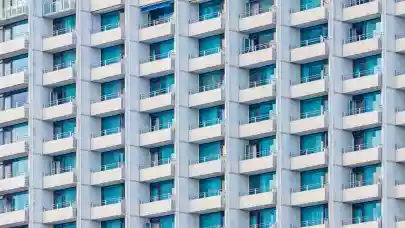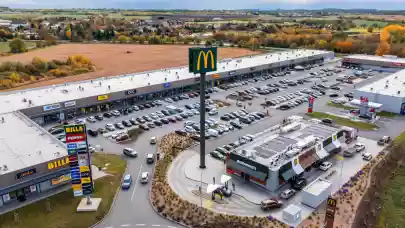
Lavinia Ioniță Rasmussen, Partner at Romanian law firm NNDKP, spoke to Property Forum about the real estate segments that are driving the real estate investment market in 2022 and the progress in harmonising national legislation with effects on the real estate industry, especially in the area of building permits. The firm has a diversified portfolio of property clients and expects a continuation of this trend this year.
This interview was first published in Property Forum’s annual listing of "The 50 most influential people on Romania’s real estate market”.
How has NNDKP’s real estate client portfolio evolved over the past year and which segments have stood out?
NNDKP’s real estate client portfolio has always included traditional clients, with whom we have a long-standing and fruitful collaboration that has given us the opportunity to contribute to their projects aimed at changing the real estate perspective of Bucharest and other key cities in Romania, as well as their related logistics infrastructure. The diversification of our portfolio mostly follows market trends, but there are also some particularities.
We can say that the logistics segment has again been the queen of new local investments in the last year, while the office market segment has remained active. A significant increase in developments has been noted in the residential sector, where demand remains at a sufficiently high level, outstripping some less favourable local contexts. Also, since the beginning of the year, a positive development of renewable energy projects with an important real estate component has been observed, confirming the growing interest shown by investors in recent years.
Have you noticed an impact of the Ukraine crisis on local investment sentiment?
In general, the situation in Ukraine is causing investors to be cautious all over the world, and Romania is no exception. Also, the very dynamic unfolding of events in the region may lead to punitive measures on various levels, with an as yet unknown economic impact. In relation to local investment sentiment, we note a slight caution among certain types of investors, especially those wishing to enter the Romanian market for the first time. However, so far, we see that in general, investments already undertaken are continuing according to plan and do not seem to be slowing down.
What have been the most complex real estate projects you have managed in the last year?
We have worked on several important transactions in the real estate segment. For example, we assisted CTP in the listing process on the Euronext Amsterdam stock exchange. We also advised an American investor on the acquisition of three projects developed on the local market. For the same client, we covered real estate law aspects in the context of an estimated €110 million green bond issue to finance the expansion of its renewable energy portfolio in Romania, Italy, and Poland.
The NNDKP team assisted an international agricultural investor in connection with the sale of over 15,000 ha of agricultural land in a transaction valued at over €50 million. We also advised a major household appliances company on the acquisition of its third factory in Romania, thus contributing to the expansion of this manufacturer’s presence in Romania.
How friendly is the Romanian legislation to foreign investors who want to take their first step in the local real estate market?
Romanian legislation is at a turning point, where there is a desire to align many segments that have been disparate and have led to inconsistencies in practice. We are talking about the area of town planning legislation, which is changing with the intention to adopt the Urban Planning Code, and the administrative area where, through the Administrative Code, a level of certainty has been established regarding many contracts such as concessions. However, as regards agricultural developments, the current legislation is relatively unfavourable to foreign investors due to the introduction of a large number of conditions for access to agricultural purchases.
Thus, the lack of clarity and predictability is still an issue to be considered but is not an impediment to market entry.
Have developers adapted to the situation regarding Zonal Urban Plans (PUZ) in Bucharest? How will this affect the pace of investment in the coming period?
Lately, there has been a quasi-freeze situation, which does not encourage investment. However, investors affected by this context are in the process of launching various initiatives with the aim of helping the public environment to take decisions that will unblock the current situation. In this context, the proactive attitude of investors who have not given up on their plans to develop quality real estate products and thus respond to the needs of the market is to be welcomed, despite a less favourable urban planning environment at the moment.
What do you think is the biggest challenge for the local real estate market in 2022?
The local property market is subject to the same uncertainties that mark the wider European context. Thus, there is a sense of unpredictability related to the cost of natural resources (gas, oil), the cost of materials in construction, and the global geopolitical context, which is deeply relevant for supply chains. However, players operating in the region generally have a high capacity to adapt, and for those who are not yet present in the region, but are very familiar with it, including the difficulties it has faced over time, the above aspects do not seem to be barriers to market entry.
How can regional cities attract more real estate investors?
As far as areas outside the capital are concerned, investment has been on an upward path since before the pandemic. Local authorities in secondary cities have created an investor-friendly environment that competes with the capital. Cities such as Cluj-Napoca, Timișoara and Iași have pioneered mixed-use real estate projects that are remarkable both in terms of utility, urban planning, and aesthetics. In this respect, the involvement of domestic capital has played an important positive role, giving confidence to foreign investors to turn their attention to these areas.
Regional cities have also attracted investor appetite in the logistics segment, which shows the potential for the development of true regional economic hubs.
Considering the deals you now have in the pipeline, do you think this year will be better for the investment market than 2021?
The last few years, although governed by unpredictability, have demonstrated investors’ openness to opportunities, the main indicator being the value and number of deals completed. The beginning of this year seems to continue the upward trend as we notice the existence of complex projects in various transactional stages. Although at this point predictions on their completion are difficult to make, the expectation is that 2022 will be at least at the same level as 2021 in terms of investments.
What are the recent legislative changes or those in the pipeline that may stimulate new real estate investment?
The value threshold for the application of the reduced VAT rate of 5% for housing has been increased in 2022 to around €140,000, compared to the previously existing threshold of around €90,000. This is expected to have a positive impact on demand in the residential segment, thus influencing investment.
In addition, there are a number of initiatives in the field of town planning and legislation governing the building permit process which are aimed at clarifying problematic provisions and unifying them. The Urban Planning Code is a long-standing goal which we hope will soon be achieved.



